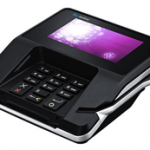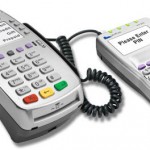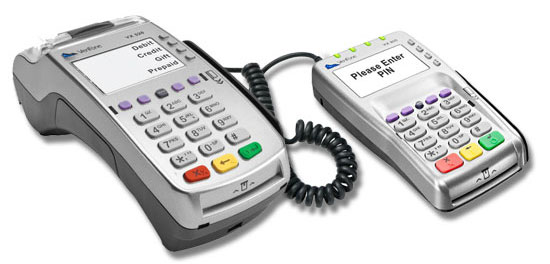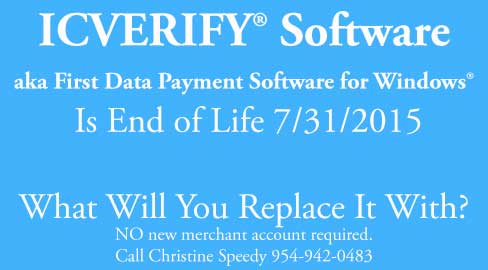What can merchants replace PCCharge with? How would it impact your business if PCCharge suddenly stopped working? October 1, 2015 is end of life and end of support, so planning replacement is critical. Because it’s also the same date as EMV liability shift, merchants will want to update to EMV and NFC compatible solutions to optimally serve customers.
Verifone PCCharge is Windows based software program which uses an internet connection to process transactions. It’s compatible with all acquirers (credit card processors), and the ‘wedge’ card reader is the most common retail set up.  There are no similar EMV certified card readers certified to any processor currently. Because EMV transactions require customers to hold onto their card for the transaction, no change is anticipated.
There are no similar EMV certified card readers certified to any processor currently. Because EMV transactions require customers to hold onto their card for the transaction, no change is anticipated.
Option one is a cloud based solution called a virtual terminal. Unlike PC software, the gateway is always up to date; merchants login to a secure web page or to integrated POS software. All virtual terminals use an internet or cloud based payment gateway.
Payment Gateways quick facts:
- Certified to each processor
- Certified for functionality, including card brand, transaction type, level III processing, contactless (Applepay for example) and even industry (retail, restaurant)
- EMV requires a special certification: each credit card terminal is certified to each processor
- Functions vary widely. Some are very much like desktop terminals but with data now web accessible, and others are intelligent platforms with a variety of merchant efficiency, security, and profit optimization benefits.
Payment gateway overview:
Each processor has their own gateway. For example, First Data Global GatewaySM e4 or Paymentech Orbital® Payment Gateway. There’s also independent or third party gateways. For example, CenPOS or Authorize.net. Third party gateways provide flexibility to change processors at will without disrupting operations, among other benefits. For all non-integrated solutions, the payment gateway manages the consumer facing terminal.
EMV Certified Terminal Confusion:
Semantics is a big problem surrounding EMV today. The hardware is first EMV level 1 and level 2 approved. Then the hardware has to be EMV certified to work with each processor. If there’s a gateway, the gateway has to certify each terminal to each processor. Marketing messages like ‘get you EMV ready’ and ‘EMV capable’ make it very unclear which solutions merchants can actually turn on and process an EMV transaction today vs get you capable to process in the future when certifications are complete. For this reason, merchants must be very specific in asking whether they can accept EMV transactions immediately for any solution purchased.
Payment gateways with certified US EMV terminals:
- CenPOS: Verifone MX 915, certified First Data, certified TSYS*, Chase Paymentech. Ingenico iSC 250. This article will get outdated fast. Contact us for the latest certifications.
As of 10/29/15 there are virtually no gateways with US EMV certified terminals other than CenPOS.
* TSYS provides flexible connectivity options for all the big acquirers. By certifying to TSYS, merchants can use the certified solution with First Data, Vantiv, NPC, Paymentech, Moneris, Global, Heartland, Elavon and others.
Option two is a countertop or desktop terminal:
Because the EMV transaction requires more memory than in the past, older countertop terminals cannot support EMV, even with an added pinpad. First Data has their own proprietary equipment; Verifone is one of the most popular brands for use with all acquirers, including First Data. The Ingenico iCT220 and iCT250 are also add on peripherals. Countertop terminals, and most gateways, do not support level III processing, critical for business to business merchants to lower merchant fees.
In summary, merchants can replace PCCharge with a universal payment gateway with certified EMV terminal, with a proprietary payment gateway that has certified EMV terminal, or with a countertop terminal, often with a separate EMV peripheral. It’s very important to ask any equipment supplier if they unit is certified for use today vs in the future.
WHICH IS THE BEST EMV SOLUTION TO REPLACE PCCHARGE?
- For business to business, there is only one solution that meets all B2B business needs: CenPOS.
- For multi-location retail, and big ticket or high risk sales (electronics, auto parts), CenPOS.
- For mom and pop retail, the VX520
- For restaurant, quickstop and grocery, I don’t know, I don’t have experience in those industries.
If your business processes more than $1M annually and you need help with EMV, contact us.





